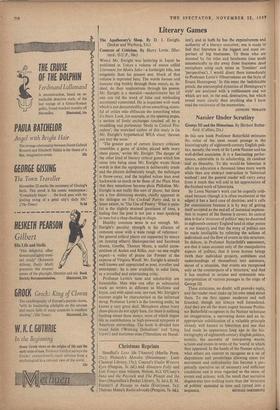Nastier Under Scrutiny
George III and the Historians. By Herbert Butter- field. (Collins, 21s.) IN this new book Professor Butterfield estimates the value of the most recent passage in the historiography of eighteenth-century English poli- tics, namely, the work of Sir Lewis Namier and his well-drilled associates. It is a fascinating perfor- mance, admirable in its scholarship, its candour and its liberality. To the would-be historian it offers an education a thousand times more worth while than any abstract instruction in 'historical method'; and the general reader will carry away from it much that will add to his appreciation of the finished work of historians.
Sir Lewis Namier's work can be cogently criti- cised because (though it is often incoherent at the edges) it has a hard core of doctrine; and it calls for examination because it is by way of getting itself accepted as the end-all of historical explana- tion in respect of the themes it covers. Its central idea is that a 'structure of politics' may be discerned in eighteenth-century England (and at other points in our history), and that the story of politics can be made intelligible by referring the actions of individuals and the flow of events to this structure. Its defects, in Professor Butterfield's assessment, are that it takes account only of the manipulative aspects of politics, that it turns human beings (with their individual projects, ambitions and understandings of themselves) into automata, slaves of a situation, that events are recognised only as the counterparts of a 'structure,' and that it has resulted in serious and systematic mis- interpretation' of various passages in the reign of George III.
These criticisms, no doubt, will provoke reply, and the reader must make up his own mind about them. To me they appear moderate and well founded, though not always well formulated. And they are all the more cogent because Profes- sor Butterfield recognises in the Namier technique an exaggeration, a narrowing 'down and an in- appropriate solidification of a valuable principle already well known to historians and one that had made its appearance long ago in the his- toriography of eighteenth-century English politics, namely, the .necessity of interpreting words, actions and events in terms of the 'world' in which they appeared. In the hands of the Namier school, what others are content to recognise as a set of dispositions and possibilities allowing room for movement and individuality has become a per- petually operative set of necessary and sufficient conditions and is even regarded as the cause of events and actions; with the result that narrative degenerates into nothing more than the 'structure of politics' extended in time and turned into a










































































 Previous page
Previous page